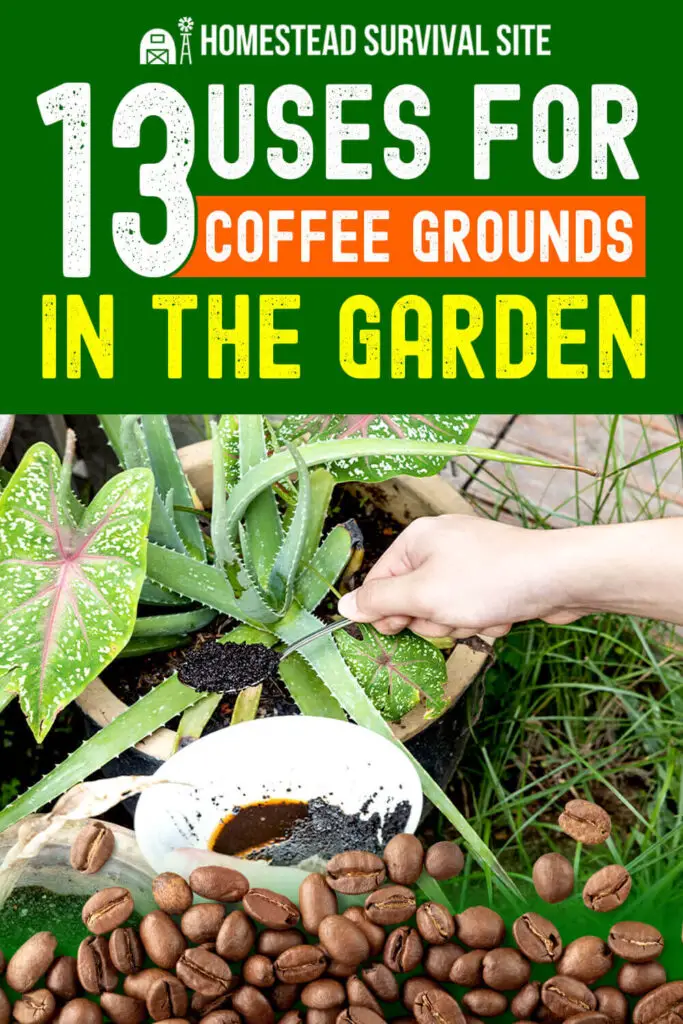[ad_1]
Estimated reading time: 11 minutes
Are you a coffee lover with a green thumb? Do you struggle to find a way to dispose of your coffee grounds in an eco-friendly way?
What if we told you that you could repurpose your coffee grounds and give your garden some love at the same time? Trust us – it’s a match made in heaven!
In this article, we’ll share some helpful tips for reusing coffee grounds in your garden. Are you ready to turn your coffee habit into a sustainable garden hack? Let’s dive in!
The morning cup of coffee is like a daily ritual to many of us. But did you know that there’s more to coffee than just the caffeine boost? The used coffee grounds that we typically toss in the bin can actually work wonders in the garden!
Yes, you read that right! Coffee grounds contain generous amounts of nitrogen, calcium, potassium, and other minerals that are beneficial to plants. They also help to retain moisture, improve soil structure, and prevent plant diseases.
Not to mention, using coffee grounds for gardening is an eco-friendly way to make use of waste products.
So, brew another pot of coffee, grab your gardening gloves, and let’s explore some creative uses for coffee grounds in the garden!
Want to save this post for later? Click Here to Pin It On Pinterest!
1. Fertilizing

Coffee grounds are an excellent source of nitrogen, phosphorus, and potassium (NPK), which are essential nutrients for plant growth.
Add a thin layer of coffee grounds on top of the soil, gently mixing it in.
Coffee grounds improve the soil structure and enhance the retention of water to the roots of the plant. You can use coffee grounds when you’re transplanting new plants or apply them weekly to your flowers, vegetables, and fruits. It can help improve their color and overall appearance.
2. Attracting Worms

Worms are key factors in soil health. They move through the soil, breaking down organic matter, aerating it, and, most importantly, providing beneficial nutrients.
If you want to increase the number of earthworms in your garden, then coffee grounds can come in handy. Worms are attracted to the organic matter released by the coffee grounds.
They will help mix the coffee grounds into the soil, which can prevent soil erosion and improve drainage.
As worms burrow through the soil, they create channels that improve airflow, leading to healthier roots for your plants.
3. Mulching

Coffee grounds serve as an excellent natural mulch, which helps the soil to retain moisture. Simply sprinkle a layer of coffee grounds over the soil evenly and ensure to keep them away from the stems of the plant to prevent rot and mold.
Be cautious not to add too much coffee as it can lead to an acidic environment that can harm the plant. Coffee grounds’ slow decomposition provides a long-lasting source of nutrients that enrich the soil with organic matter and improve the soil’s texture as it breaks down.
4. Propagating Plants from Cuttings

Using coffee grounds as a rooting hormone is an effective way of propagating new plants from cuttings. The caffeine in coffee grounds acts as a natural stimulant, encouraging root growth and reducing the chances of the cutting rotting.
Simply dip the cutting in a shallow dish of moist coffee grounds before planting it in the soil.
5. Boosting Acid-Loving Plants

Coffee grounds are highly acidic, making them an ideal addition to the soil of acid-loving plants like blueberries, azaleas, and rhododendrons. Adding coffee grounds to the soil can improve the pH level, leading to healthier and more vibrant plants.
However, you should avoid using coffee grounds on plants that prefer alkaline soil, such as tomatoes, cabbage, and parsley.
6. Repelling Slugs

Did you know that coffee grounds can repel slugs and snails? The caffeine and acidity in coffee grounds impair the mollusks’ senses, making them less likely to crawl over it. Sprinkle coffee grounds around the base of your plants to keep slugs and snails at bay.
7. Building Up the Compost

Using coffee grounds in the compost is a great way to add organic matter and nitrogen to the mix. Nitrogen is one of the key nutrients that plants need for healthy growth, and coffee grounds can be an excellent source of it.
Adding coffee grounds to the compost can also help to balance out the carbon-to-nitrogen ratio, which is important for the composting process. Just make sure to mix the coffee grounds well with other compost materials, such as leaves and kitchen scraps, to avoid clumping.
8. Helping Out Roses and Hydrangeas

Roses and hydrangeas are two popular garden plants that can benefit greatly from the use of coffee grounds. Rose plants, in particular, thrive in soil that is rich in nutrients, and coffee grounds can help to achieve this.
Sprinkling coffee grounds around the base of the plant can provide a slow-release source of nitrogen that will feed the plant over time.
Hydrangeas, on the other hand, will benefit from more acidic soil, which can be achieved by adding coffee grounds to the soil. This will not only help the plant to grow better, but it can also influence the color of the flowers.
9. Preventing Pathogenic Fungi

Coffee grounds contain compounds that have antifungal properties, which can be helpful in preventing pathogenic fungi from attacking your plants.
One way to use coffee grounds for this purpose is to mix them with water to make a spray that can be applied to the leaves of susceptible plants.
Another option is to add coffee grounds directly to the soil, which will create an environment that is less hospitable to fungal growth. This is especially helpful for plants like tomatoes, which are prone to fungal diseases.
10. Deterring Bees and Wasps

Bees and wasps can be a nuisance in your garden, and if you’re allergic to their sting, they can be dangerous, too.
The strong smell of coffee grounds is known to repel these insects. Spread coffee grounds in your garden and around your seating areas to detour them from coming near you. This is an environmentally friendly alternative to chemical insecticides.
11. Watering and Feeding Potted Plants

Coffee grounds are rich in nutrients like potassium, nitrogen, and phosphorus. These nutrients are essential for plant growth. Simply sprinkle some coffee grounds on top of the soil of your potted plants and mix it in with the soil. You can also use diluted coffee to water your plants.
This technique helps to retain and regulate moisture in the soil, which is vital for the healthy growth of the plants.
12. Inhibiting Weeds

Weeds can quickly get out of hand in your garden and make it difficult for your plants to grow healthily. But coffee grounds can work wonders in this area, too.
By sprinkling coffee grounds on top of weed-infested areas, you can suppress weed growth because coffee grounds are acidic in nature. This will also add organic matter, eventually enriching your soil.
13. Boosting the Vermicomposting Bin

If you have a vermicomposting bin, then you can put your coffee grounds to good use in this regard, too. Worms feed off of coffee grounds, as it is rich in nutrients. This will subsequently increase worm reproduction and help to maintain a healthy composting bin.
Plus, this will produce nutrient-rich soil that you can use in your garden for healthy plant growth.
Can I Just Sprinkle Coffee Grounds in My Garden?
As you now know, one of the main benefits of coffee grounds is that they are high in nitrogen, a key nutrient that plants need for growth and leafy development. Coffee grounds also contain smaller amounts of other important minerals like potassium, phosphorus, and calcium.
However, there are some potential downsides to using coffee grounds in your garden.
First and foremost, coffee grounds are acidic, with a pH of around 6.0. While some plants like acidic soil, others prefer a more neutral or alkaline environment. If your soil is already acidic, adding coffee grounds could further lower the pH and harm your plants.
It’s also worth noting that coffee grounds do not contain all the nutrients that plants need, so using them as a sole fertilizer may not be sufficient for optimal growth.
Finally, caffeine – a natural compound found in coffee – can inhibit the growth of certain plants, including tomatoes, and may also prevent seed germination in some cases.
So, what’s the verdict? If you’re interested in using coffee grounds in your garden, the key is to do so in moderation and with some precautions. Here are some tips to keep in mind:
- Use coffee grounds sparingly – no more than 10-15% of your total soil volume. Too much coffee grounds can disrupt the soil’s pH balance and harm beneficial soil organisms.
- Avoid using coffee grounds around plants that prefer neutral or alkaline soil, such as most vegetables.
- Mix coffee grounds with other organic materials like compost or leaf mold to balance out the nutrient profile and improve soil structure.
- Don’t use coffee grounds in areas where dogs or other animals may be able to access them, as caffeine can be toxic to dogs in large quantities.
- Finally, don’t rely solely on coffee grounds as your fertilizer – consider using a balanced organic fertilizer or supplementing with other amendments like bonemeal or fish emulsion.
Final Thoughts

Coffee grounds can be a useful addition to your garden as long as you use them responsibly and in moderation. They can help improve soil structure and provide some important nutrients, but should not be used as a sole fertilizer or around plants that prefer alkaline soil.
Happy gardening (and coffee drinking)!
Like this post? Don’t Forget to Pin It On Pinterest!
[ad_2]
Source link
Get more stuff like this
in your inbox
Don't Be Left Unprepared
Thank you for subscribing.
Something went wrong.






